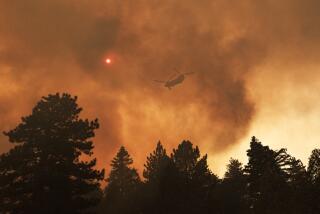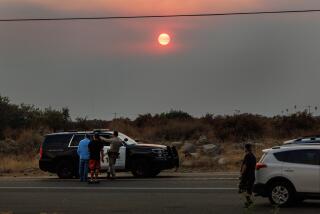Southland Smog ‘Snitches’ Keep Hot Line Busy : Pollution: Calls to a state number reporting the license numbers of smoke-spewing vehicles are averaging about 16,000 a month.
More than 350,000 motorists fuming over smoke-spewing cars and trucks have become smog “snitches” over the past three years in a region that has the nation’s dirtiest air.
Calls to a toll-free hot line operated by the South Coast Air Quality Management District to report the license plate numbers of smoking vehicles have totaled 348,000 since the program started in June, 1988.
The district, which has enforcement power over Los Angeles, Orange, Riverside and San Bernardino counties, is getting an average of about 16,000 calls a month to the hot line--1-800-CUT-SMOG.
“As far as we know, our program is unique,” district spokeswoman Claudia Keith said. “We have not heard of any other pollution-control district doing this.”
California requires that vehicles pass an emissions test every two years, but recent research has shown that during the periods between the tests, older vehicles can pump out disproportionate levels of smog-forming elements.
The state Bureau of Automotive Repair, which runs the smog check program, said 10% of the state’s cars send out 61.4% of the hydrocarbons and 59.8% of the carbon monoxide.
Los Angeles-based Unocal Corp., which bought more than 8,000 pre-1975 cars last year for $700 apiece in a move to help reduce pollution, said the cars that it bought were sometimes emitting pollutants at 100 times the levels that new cars would.
The district’s program received a big boost a year ago when it spent $82,000 to buy space on 125 local billboards, each showing a car with a dense cloud of smoke and the words “Report this crime: 1-800-CUT-SMOG.” The number of calls, which had been running at about 5,000 a month, more than tripled during the campaign.
“We were somewhat overwhelmed at the response,” Keith said. “It took us awhile to put the logistics together that we needed to catch up to the volume.”
Keith said the district is planning another campaign for this spring to publicize the program, probably again through billboards.
Callers must report the location of the offense, the time and the make of the vehicle in addition to the license plate number. The district is only empowered to track down the owner of the vehicle and send a letter--written in English and Spanish--with a warning that excessive smoke is against the law.
“On (observed date), at (observed time), a (vehicle make, model), California license number (number) was reported by a fellow driver as emitting smoke on (freeway/street) at (off ramp/cross street) in the city of (observed city),” it begins. “Records indicate that this vehicle is registered in your name.”
The letter then advises the owner to check the car and complete an enclosed compliance form, which comes with a self-addressed and postage-paid envelope. About half of those who get the letters return them, and half of those say they have taken care of the problem.
The other half who respond, however, claim there is no problem, Keith said.
About 60% of the vehicles reported in the program are trucks; 35% are cars and the remainder are buses or motorcycles.
The letter also tells the owner that emissions from vehicles are a “major source” of air pollution and warns: “Local law enforcement agencies and the California Highway Patrol will cite drivers of such vehicles and you may be subject to a fine of at least $100.”
The district has a $700,000 yearly contract with the CHP to fund eight officers in specially marked white cars who work solely on issuing citations for smoking vehicles. Those are running at about 1,000 a month, with about 80% of those cited being trucks, district spokeswoman Paula Levy said.






